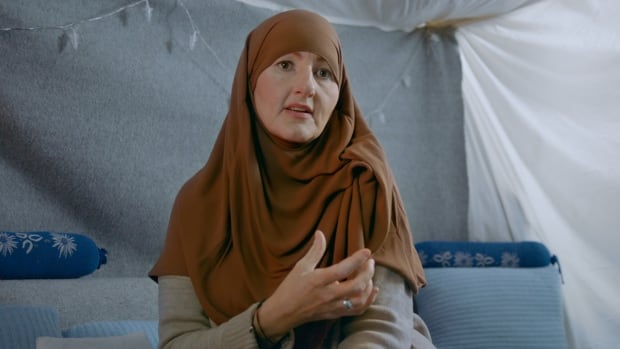Canadian Kimberly Polman arrested after repatriated from Syrian detention camp for ISIS fighters’ families
Canadian Kimberly Polman has been arrested after arriving in Canada following her repatriation from a detention camp in Syria, according to her lawyer.
Polman has been detained for the past three years at al-Roj Syrian detention camp for families of ISIS fighters. She travelled to Syria in 2015 after marrying an ISIS fighter online and has said she was in a “terrible place” at the time.
Her lawyer Lawrence Greenspon confirmed to CBC News that Polman arrived in Montreal Wednesday morning and is on her way to Abbotsford, B.C.
Polman has been arrested under Section 810 of the Criminal Code and authorities are seeking a peace bond, said Greenspon — a court order used to keep people from committing or recommitting crimes, which requires they agree to specific conditions to keep the peace.
In total, two women and two children have now been repatriated during this latest operation from a detention camp in northeast Syria that holds women with alleged ties to ISIS and their children, Global Affairs Canada confirmed Wednesday morning.
“Canada thanks the Autonomous Administration of North and East Syria for its co-operation and recognizes its efforts in providing care for the detained individuals under an extremely difficult security situation and adverse circumstances,” wrote Global Affairs Canada in a statement to CBC News.
Global Affairs said the United States helped with the operation. It’s still unclear exactly what role Canada played in the repatriation of the four Canadians.
WATCH | At least 2 Canadian women and their children have left ISIS detention camp:
At least two women, along with their children, have left an ISIS detention camp in Syria and are expected to return to Canada this week, CBC News has learned. It’s unclear what role Canada played in the repatriation effort.
Canada’s position has been that, for security reasons, it would not send consular assistance to meet these women, even though a number of other western countries have done so. France repatriated 40 children and 15 women from Kurdish-run camps in Syria last week.
Global Affairs Canada said due to privacy concerns it “cannot share details of the repatriation for operational security reasons” or the identities of those brought home.
The repatriation of Polman comes eight months after United Nations human rights experts urged Canada to repatriate Polman and said her conditions met the definition of “torture, cruel, inhuman and degrading treatment.”
Health issues cited
“Her health is very dire and she is in a very, very tenuous health situation and condition and I’m certain that that is a very large part of the reason why she is being brought home,” Greenspon said.
Polman qualified for “extraordinary assistance” under a new policy adopted last year by Global Affairs Canada for those who could not be treated in Syria for life-threatening medical conditions, according to Greenspon.
CBC News asked Public Safety Minister Marco Mendicino on Tuesday about the government’s involvement in the latest repatriation efforts. “We don’t talk about any individual case,” he replied.
“Supporting a terrorist group, whether here or abroad, is a serious criminal offence,” said Mendicino on Tuesday. “Those who engage in that kind of activity will face the full force of the law.”
Canada has also helped facilitate the repatriation of a five-year-old Canadian orphan in 2020 and a four-year-old girl and later her mother in 2021.
Human Rights Watch estimates that before today, roughly four dozen Canadian men, women and children — most of them under the age of six — remained in detention camps in Syria.
WATCH | The Canadian mothers inside an ISIS detention camp:
As word spreads in the al-Roj Syrian detention camp for families of ISIS fighters that a four-year-old Canadian girl was freed, other mothers grapple with sending their own children to safety. Some say they couldn’t survive without them, while others beg Canada to bring them to safety.
Farida Deif, the Canada director at Human Rights Watch, hopes the latest round of repatriations signals the government is changing its policy and will bring others home. She calls the government’s approach piecemeal and increasingly an outlier compared ot other countries.
“Really the approach of the government thus far has been abysmal,” said Deif.
“The prime minister has not wanted to spend any political capital to repatriate anyone with suspected ISIS ties and has essentially abandoned Canadians in conditions of unlawful detention, in inhumane and squalid conditions.”
The prime minister said Tuesday that the government has protocols in place and pays close “attention to the wellbeing of children” in the camps.
Global Affairs said the government “remains steadfast in its vigilance over the security and safety of Canadians and takes a robust approach to this issue.”



